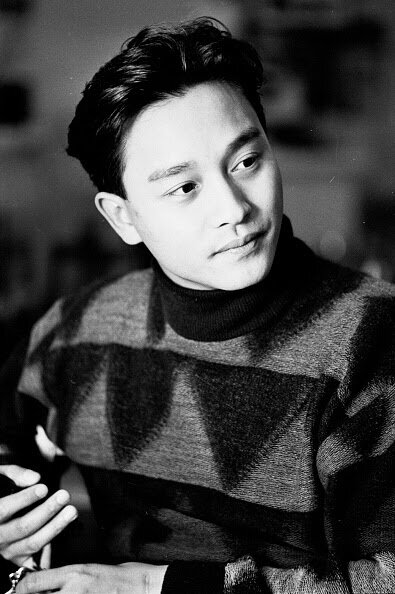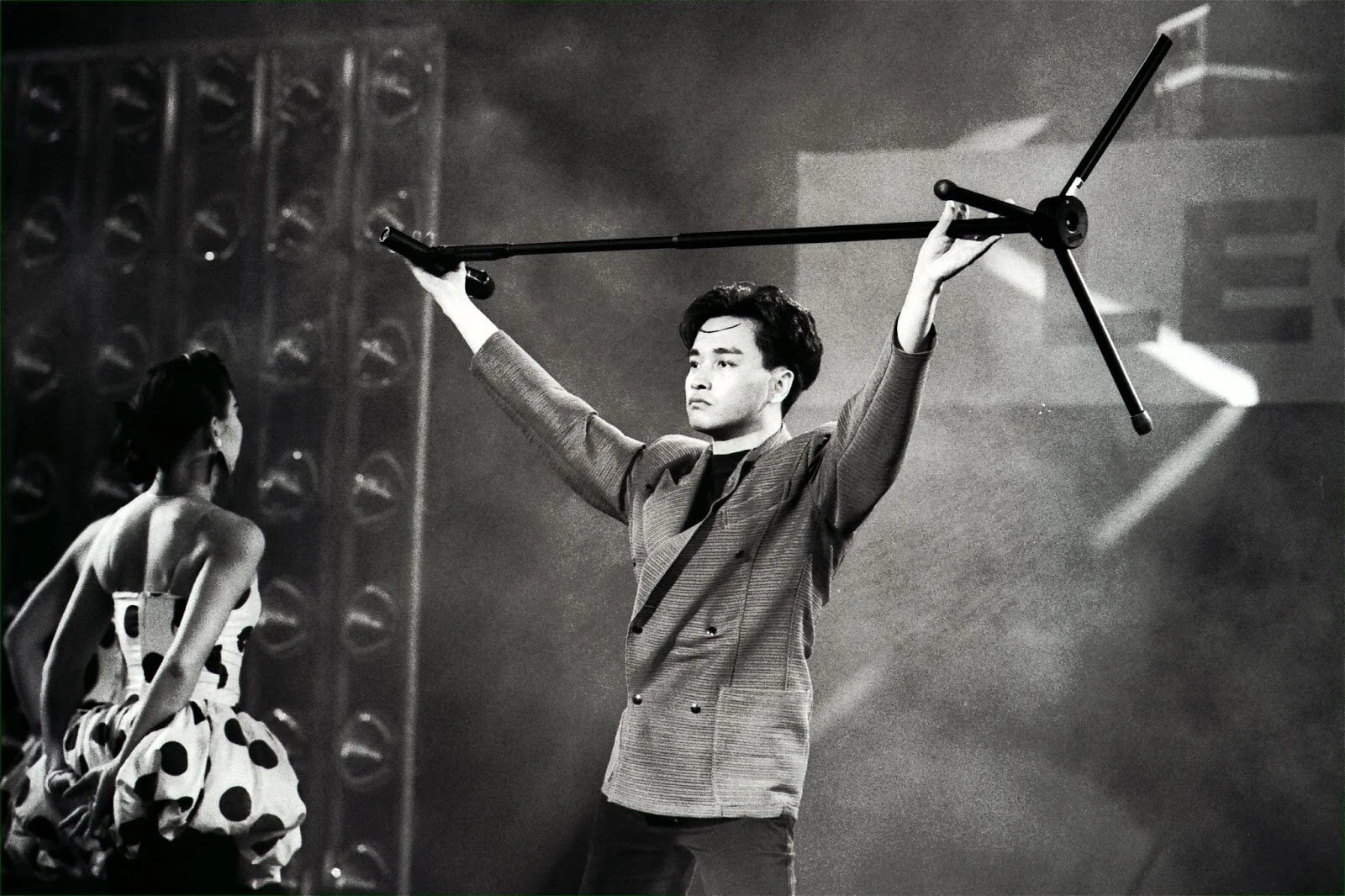Music Without Borders: Miss You Much, Leslie Cheung
Eighteen years after Leslie Cheung’s untimely death, his music and the pop culture of 1980s Hong Kong seem more relevant than ever.
Music has the power to transport listeners to cultures and places different from their own. In Music Without Borders, our writers introduce you to international artists, bands, and genres that explore the sounds that bring us together.
Written by Wonjune Lee
Photo courtesy of Peter Tse
No discussion of 1980s Korean culture would be complete without mentioning the phenomenon that was Cantopop. From movies and music to overly dramatic television commercials, Hong Kong culture was everywhere, and stars like Andy Lau and Joey Wong captured the hearts of Korean teenagers. The exotic, cosmopolitan glitz of '80s Hong Kong offered them a window into a fantastical, wealthy, and free world in an era when their schools’ classes were often cut short due to tear gas flooding the classroom.
Among the many Cantopop celebrities, no one wore the fantasy and freedom of Hong Kong better than Cheung Kwok-wing, widely known by his English name, Leslie Cheung. Born in the British Crown colony of Hong Kong as the son of a successful tailor who catered to Hong Kong’s white elite, Cheung had a childhood emblematic of his city. He spent his youth in English boarding schools and universities, where he was neither fully British nor fully Chinese.
Cheung’s career in entertainment started off slow, with his first three albums flopping, and his cinema career starting with roles in softcore pornography. He eventually found musical success with his first single, and titular album, “風繼續吹 [The Wind Blows On],” a remake of “さよならの向こう側 [The Other Side of Goodbye]” by Japanese singer Momoe Yamaguchi. The track established the kind of music he would become famous for: R&B-esque ballads featuring sentimental lyrics about loneliness and love. As a re-recording of a song by a female artist, “The Wind Blows On” highlights Cheung’s wide vocal range and the calm, yet passionate quality of his voice, which allows for a uniquely androgynous expression of sentimentality. “The Wind Blows On” became the first of Cheung’s gold-certified albums, and kicked off an overwhelmingly successful musical career in which he released 10 more albums that were certified gold or platinum.
Photo courtesy of Ren Hang
Another striking aspect of Cheung’s music is how evocative it is of his birth city. Most of Cheung’s songs deal with themes of unrequited, or otherwise unsuccessful, love. With his high, yet firm voice, Cheung imbues his music with an extremely personal and intimate quality, giving listeners the feeling that he is calling out to them in the hope that his sadness will be recognized (even if they don’t understand the Cantonese lyrics). Many of his songs feature a slight echo to his voice that further amplifies this feeling, and the slow, synthesized orchestral riffs in tracks like “想你 [Miss You]” add a professional sheen to his music, as well as a sense of nostalgia. The intimate and sentimental quality of Cheung’s music is reminiscent of how deeply personal loneliness can be in a dense metropolis like Hong Kong. In “有誰共鳴 [Who Resonates With Me],” Cheung sings, “Look up at the quiet starry sky / I walk alone, the rain at night gradually stops / Speechless is the calmness of this moment.” At times, not even the bustling streets of a city can offer someone to confide in.
Cheung is just as renowned for his acting as he is for his music. His roles in iconic Hong Kong films like “A Better Tomorrow” and “A Chinese Ghost Story” have left lasting influence on a wide range of cinematic genres, ranging from action to romance, and they remain some of the most iconic roles in Hong Kong film. Of them, Cheung’s most acclaimed role is undoubtedly in “Farewell My Concubine,” a film that explores art and artists in a changing world that no longer seems to have room for either. The movie takes place in China during the Cultural Revolution, when ideas deemed bourgeois and reactionary were denounced, leading to the destruction of many Chinese artifacts and historical art forms. In the film, Cheung plays Dieyi, a boy raised to play female characters in a Chinese opera troupe because of his perceived feminine features. “Farewell My Concubine” follows the tragedies of Dieyi’s life, as he loves a heterosexual man, but Mao’s Red Guards force him to denounce his love as a reactionary and a deviant.
Photo courtesy of Dreamfact Entertainment
“Farewell My Concubine” premiered in Hong Kong, and was initially banned in mainland China for two months due to its depiction of homosexuality, suicide, and the Cultural Revolution. Cheung’s role in the film reflects his personal struggles with his sexuality and the public’s perception of it. He was constantly scrutinized for being openly queer and for having a same-sex relationship with his childhood friend, Daffy Tong Hok-tak. He was also criticized for his portrayal of gay characters in other works, such as his music video for the track “梦到内河 [Bewildered],” which broadcasters in Hong Kong censored outright.
On April 1, 2003, Cheung was found dead at the Mandarin Oriental Hotel in Hong Kong, having died by suicide. He was 46 years old.
In the days following his death, it was revealed that Cheung had been diagnosed with, and was receiving treatment for, clinical depression. In his last note, which began with the word “Depression!!” Cheung asked, “I have done nothing wrong this life; so why is it like this?” Perhaps a reflection of the fact that his sexuality, not his conduct, had driven so much of the public discourse about him in years prior.
Eighteen years after his untimely death, Hong Kong has become a very different place. Once, Korean youth viewed the music and cinema of Hong Kong as an escape from the grim realities of life. It was a place where even queer artists like Cheung were free to express themselves, even as they received criticism. Looking at the Hong Kong of today, it’s hard not to wonder whether Cheung would be welcomed there. Would he, like so many other Hong Kong celebrities, have simply left the city of his birth? Would he have spoken out against the militarization of classrooms? The jailing of activists? What would he have thought, seeing the streets of his beloved city covered in tear gas? We’ll never know, but one thing is clear — Cheung’s music serves as a reminder of the Hong Kong that was, and the different people that made it beautiful.
Here’s a playlist of some of Cheung’s most famous tracks in his memory, perfect for rainy nights under neon lights.



